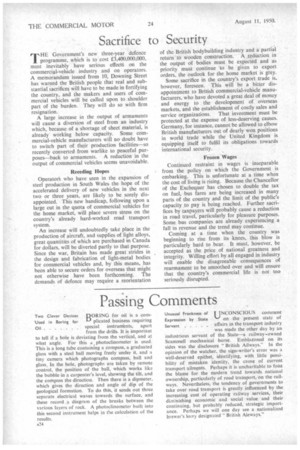Sacrifice to Security
Page 26

If you've noticed an error in this article please click here to report it so we can fix it.
THE Government's new three-year defence programme, which is to cost 0,400,000,000, must inevitably have serious effects on the commercial-vehicle industry and on operators. A memorandum issued from 10, Downing Street has warned the British people that real and substantial sacrifices will have to be made in fortifying the country, and the makers and users of commercial vehicles will be called upon to shoulder part of the burden. They will do so with firm resignation.
A large increase in the output of armaments will cause a diversion of steel from an industry which, because of a shortage of sheet material, is already working below capacity. Some commercial-vehicle manufacturers will no doubt have to switch part of their production facilities—so recently converted from warlike to peaceful purposes—back to armaments. A reduction in the output of commercial vehicles seems unavoidable.
Receding Hopes Operator § who have seen in the expansion of steel production in South Wales the hope of the accelerated delivery of new vehicles in the next two or three years, are likely to be sorely disappointed. This new handicap, following upon a large cut in the quota of commercial vehicles for the home market, will place severe stress on the country's already hard-worked road transport system.
An increase will undoubtedly take place in the production of aircraft, and supplies of light alloys, great quantitibs of which are purchased in Canada for dollars, will be diverted partly to that purpose. Since the war, Britain has made great strides in the design and fabrication of light-metal bodies for commercial vehicles and, by this means, has been able to secure orders for overseas that might not otherwise have been forthcoming. The demands of defence may require a reorientation of the British bodybuilding industry and a partial return 'to wooden construction. A reduction in the output of bodies must be expected and as priority must continue to be given to export orders, the outlook for the home market is grey.
Some sacrifice in the country's export trade is, however, foreseen. This will be a bitter disappointment to British commercial-vehicle manufacturers, who have devoted a great deal of money and energy to the development of overseas markets, and the establishment of costly sales and service organizations. That investment must be protected at the expense of less-deserving causes. Germany, for instance, cannot be allowed to elbow British manufacturers out of dearly won positions in world trade while the United Kingdom is equipping itself to fulfil its obligations towards international security.
Frozen Wages Continued restraint in wages is inseparable from the policy on which the Government is embarking. This is unfortunate at a time when the cost of living is rising. Because the Chancellor of the Exchequer has chosen to double the tax on fuel, bus fares are being increased in many parts of the country and the limit of the public's capacity to pay is being reached. Further sacrifices by taxpayers will probably cause a reduction in road travel, particularly for pleasure purposes. Some bus companies are already experiencing a fall in revenue and the trend may continue.
Coming at a time when the country was beginning to rise from its knees, this blow is particularly hard to bear. It must, however, be accepted as the price of national greatness and integrity. Willing effort by all engaged in industry will enable the disagreeable consequences of rearmament to be smoothed over and will ensure that the country's commercial life is not too seriously disrupted.












































































